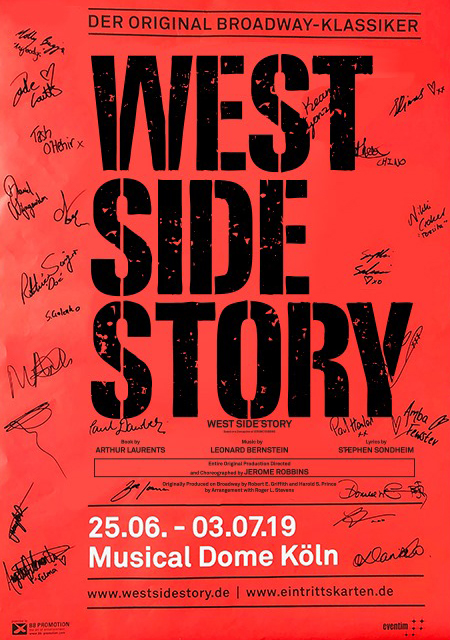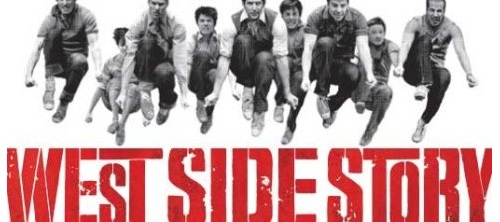
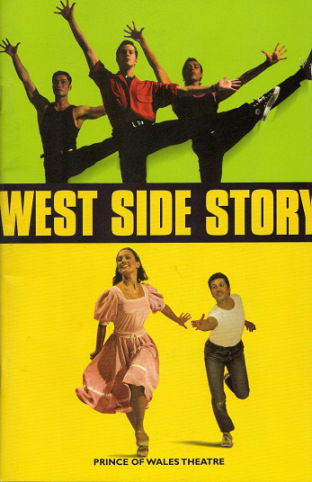
Version 9
West Side Story (1998-10-London Run)
Type de série: RevivalThéâtre: London Run (Londres - Angleterre)Durée : 1 an 3 mois Nombre : 522 représentationsPremière Preview : mardi 06 octobre 1998Première : mardi 06 octobre 1998Dernière : samedi 08 janvier 2000Mise en scène : Alan Johnson • Chorégraphie : Alan Johnson • Producteur : Avec : David Habbin (Tony), Katie Knight-Adams (Maria), Edward Baker-Duly (Riff), Edward Hayes-Neary (Diesel), Graham Macduff (Bernardo), Anna-Jane Casey (Anita) , Teddy Green, Alexander DelamereCommentaires : This touring production was as near as possible a complete re-creation of the original version from 40 years earlier - with some added significance in that Jerome Robbins had died a few months prior to its revival. Several critics felt the magnificent show had a whiff of mothballs about it, and needed a completely new approach (like the current “Oklahoma” at the National Theatre.) The “dream ballet” was especially felt to be very dated, and the finger-clicking routines seemed over-choreographed and lacking spontaneity for today’s audiences.) However, others felt it held up extremely well and everyone agreed it remained one of the most brilliant scores in musical theatre. It ran for fifteen weeks at the Prince Edward and then transferred to the Prince of Wales for another year, closing January 8th 2000.
Prince Edward Theatre: 6/10/1998 - 16/1/1999
Prince of Wales Theatre: 22/1/1999 - 8/1/2000
Située dans le New York du milieu des années 1950, l'intrigue cible surtout la rivalité entre Jets et Sharks, deux bandes de jeunes des bas-quartiers, pour le monopole du territoire. Les Sharks appartiennent à la première génération d'Américains émigrés de Porto Rico. Ils sont raillés par les Jets, jeunes de la classe ouvrière blanche qui se considèrent comme les véritables Américains car nés en Amérique, même si de parents eux-mêmes émigrés, qui d'Irlande ou de Suède ou encore de Pologne. Tony, amis du chef des Jets Riff, rencontre Maria, la sœur de Bernardo, chef des Sharks. Ils tombent amoureux pour le meilleur et le pire.
Inspiré de la tragédie Roméo et Juliette de William Shakespeare
Genesis of the concept
In 1947, Jerome Robbins approached Leonard Bernstein and Arthur Laurents about collaborating on a contemporary musical adaptation of Romeo and Juliet. He proposed that the plot focus on the conflict between an Irish American Roman Catholic family and a Jewish family living on the Lower East Side of Manhattan, during the Easter–Passover season. The girl has survived the Holocaust and emigrated from Israel; the conflict was to be centered around anti-Semitism of the Catholic "Jets" towards the Jewish "Emeralds" (a name that made its way into the script as a reference). Eager to write his first musical, Laurents immediately agreed. Bernstein wanted to present the material in operatic form, but Robbins and Laurents resisted the suggestion. They described the project as "lyric theatre", and Laurents wrote a first draft he called East Side Story. Only after he completed it did the group realize it was little more than a musicalization of themes that had already been covered in plays like Abie's Irish Rose. When he opted to drop out, the three men went their separate ways, and the piece was shelved for almost five years.
In 1955, theatrical producer Martin Gabel was working on a stage adaptation of the James M. Cain novel Serenade, about an opera singer who comes to the realization he is homosexual, and he invited Laurents to write the book. Laurents accepted and suggested Bernstein and Robbins join the creative team. Robbins felt if the three were going to join forces, they should return to East Side Story, and Bernstein agreed. Laurents, however, was committed to Gabel, who introduced him to the young composer/lyricist Stephen Sondheim. Sondheim auditioned by playing the score for Saturday Night, his musical that was scheduled to open in the fall. Laurents liked the lyrics but was not impressed with the music. Sondheim did not care for Laurents' opinion. Serenade ultimately was shelved.
Laurents was soon hired to write the screenplay for a remake of the 1934 Greta Garbo film The Painted Veil for Ava Gardner. While in Hollywood, he contacted Bernstein, who was in town conducting at the Hollywood Bowl. The two met at the Beverly Hills Hotel, and the conversation turned to juvenile delinquent gangs, a fairly recent social phenomenon that had received major coverage on the front pages of the morning newspapers due to a Chicano turf war. Bernstein suggested they rework East Side Story and set it in Los Angeles, but Laurents felt he was more familiar with Puerto Ricans and Harlem than he was with Mexican Americans and Olvera Street. The two contacted Robbins, who was enthusiastic about a musical with a Latin beat. He arrived in Hollywood to choreograph the dance sequences for The King and I, and he and Laurents began developing the musical while working on their respective projects, keeping in touch with Bernstein, who had returned to New York. When the producer of The Painted Veil replaced Gardner with Eleanor Parker and asked Laurents to revise his script with her in mind, he backed out of the film, freeing him to devote all his time to the stage musical.
Collaboration and developmentIn New York, Laurents went to the opening night party for a new play by Ugo Betti, and there he met Sondheim, who had heard that East Side Story, now retitled West Side Story, was back on track. Bernstein had decided he needed to concentrate solely on the music, and he and Robbins had invited Betty Comden and Adolph Green to write the lyrics, but the team opted to work on Peter Pan instead. Laurents asked Sondheim if he would be interested in tackling the task. Initially he resisted, because he was determined to write the full score for his next project (Saturday Night had been aborted), but Oscar Hammerstein convinced him that he would benefit from the experience, and he accepted. Meanwhile, Laurents had written a new draft of the book changing the characters' backgrounds: Anton, once an Irish American, was now of Polish and Irish descent, and the formerly Jewish Maria had become a Puerto Rican.
The original book Laurents wrote closely adhered to Romeo and Juliet, but the characters based on Rosaline and the parents of the doomed lovers were eliminated early on. Later the scenes related to Juliet's faking her death and committing suicide also were deleted. Language posed a problem; four-letter curse words were uncommon in the theatre at the time, and slang expressions were avoided for fear they would be dated by the time the production opened. Laurents ultimately invented what sounded like real street talk but actually was not: "cut the frabba-jabba", for example.[12] Sondheim converted long passages of dialogue, and sometimes just a simple phrase like "A boy like that would kill your brother", into lyrics. With the help of Oscar Hammerstein, Laurents convinced Bernstein and Sondheim to move "One Hand, One Heart", which he considered too pristine for the balcony scene, to the scene set in the bridal shop, and as a result "Tonight" was written to replace it. Laurents felt that the building tension needed to be alleviated in order to increase the impact of the play's tragic outcome, so comic relief in the form of Officer Krupke was added to the second act. He was outvoted on other issues: he felt the lyrics to "America" and "I Feel Pretty" were too witty for the characters singing them, but they stayed in the score and proved to be audience favorites. Another song, "Kid Stuff", was added and quickly removed during the Washington, D.C. tryout when Laurents convinced the others it was helping tip the balance of the show into typical musical comedy.
Bernstein composed West Side Story and Candide concurrently, which led to some switches of material between the two works. Tony and Maria's duet, "One Hand, One Heart", was originally intended for Cunegonde in Candide. The music of "Gee, Officer Krupke" was pulled from the Venice scene in Candide. Laurents explained the style that the creative team finally decided on: "Just as Tony and Maria, our Romeo and Juliet, set themselves apart from the other kids by their love, so we have tried to set them even further apart by their language, their songs, their movement. Wherever possible in the show, we have tried to heighten emotion or to articulate inarticulate adolescence through music, song or dance."
The show was nearly complete in the fall of 1956, but almost everyone on the creative team needed to fulfill other commitments first. Robbins was involved with Bells Are Ringing, then Bernstein with Candide, and in January 1957 A Clearing in the Woods, Laurents' latest play, opened and quickly closed. When a backers' audition failed to raise any money for West Side Story late in the spring of 1957, only two months before the show was to begin rehearsals, producer Cheryl Crawford pulled out of the project. Every other producer had already turned down the show, deeming it too dark and depressing. Bernstein was despondent, but Sondheim convinced his friend Hal Prince, who was in Boston overseeing the out-of-town tryout of the new George Abbott musical New Girl in Town, to read the script. He liked it but decided to ask Abbott, his longtime mentor, for his opinion, and Abbott advised him to turn it down. Prince, aware that Abbott was the primary reason New Girl was in trouble, decided to ignore him, and he and his producing partner Robert Griffith flew to New York to hear the score.[19] In his memoirs, Prince recalled, "Sondheim and Bernstein sat at the piano playing through the music, and soon I was singing along with them."
Production period
Prince began cutting the budget and raising money. Robbins then announced he did not want to choreograph the show, but changed his mind when Prince agreed to an eight-week dance rehearsal period (instead of the customary four), since there was to be more dancing in West Side Story than in any previous Broadway show, and allowed Robbins to hire Peter Gennaro as his assistant.[20] Originally, when considering the cast, Laurents wanted James Dean for the lead role of Tony, but the actor had died before hearing of it. Sondheim found Larry Kert and Chita Rivera, who created the roles of Tony and Anita, respectively. Getting the work on stage was still not easy. Bernstein told Rolling Stone: "Everyone told us that [West Side Story] was an impossible project ... And we were told no one was going to be able to sing augmented fourths, as with "Ma-ri-a" ... Also, they said the score was too rangy for pop music ... Besides, who wanted to see a show in which the first-act curtain comes down on two dead bodies lying on the stage?... And then we had the really tough problem of casting it, because the characters had to be able not only to sing but dance and act and be taken for teenagers. Ultimately, some of the cast were teenagers, some were 21, some were 30 but looked 16. Some were wonderful singers but couldn't dance very well, or vice versa ... and if they could do both, they couldn't act."
Throughout the rehearsal period, the New York newspapers were filled with articles about gang warfare, keeping the show's plot timely. Robbins kept the cast members playing the Sharks and the Jets separate in order to discourage them from socializing with each other and reminded everyone of the reality of gang violence by posting news stories on the bulletin board backstage. Robbins wanted a gritty realism from his sneaker- and jeans-clad cast. He gave the ensemble more freedom than Broadway dancers had previously been given to interpret their roles, and the dancers were thrilled to be treated like actors instead of just choreographed bodies. As the rehearsals wore on, Bernstein fought to keep his score together, as other members of the team called on him to cut out more and more of the sweeping or complex "operatic" passages. Columbia Records initially declined to record the cast album, saying the score was too depressing and too difficult.
There were problems with Oliver Smith's designs. His painted backdrops were stunning, but the sets were, for the most part, either shabby looking or too stylized. Prince refused to spend money on new construction, and Smith was obliged to improve what he had as best he could with very little money to do it.
The pre-Broadway run in Washington, D.C. was a critical and commercial success, although none of the reviews mentioned Sondheim, listed as co-lyricist, who was overshadowed by the better-known Bernstein. Bernstein magnanimously removed his name as co-author of the lyrics, although Sondheim was uncertain he wanted to receive sole credit for what he considered to be overly florid contributions by Bernstein. Robbins demanded and received a "Conceived by" credit, and used it to justify his making major decisions regarding changes in the show without consulting the others. As a result, by opening night on Broadway, none of his collaborators were talking to him.
It has been rumored that while Bernstein was off trying to fix the musical Candide, Sondheim wrote some of the music for West Side Story, and that Bernstein's co-lyricist billing mysteriously disappeared from the credits of West Side Story during the tryout, presumably as a trade-off. However, Suskin states in Show Tunes that "As the writing progressed and the extent of Bernstein's lyric contributions became less, the composer agreed to rescind his credit...Contrary to rumor, Sondheim did not write music for the show; his only contribution came on "Something's Coming", where he developed the main strain of the chorus from music Bernstein wrote for the verse.)
Original Broadway production
After auditions in Washington, D.C. and Philadelphia beginning in August 1957, the original Broadway production opened at the Winter Garden Theatre on September 26, 1957 to positive reviews. The production was directed and choreographed by Jerome Robbins, produced by Robert E. Griffith and Harold Prince and starred Larry Kert as Tony, Carol Lawrence as Maria, Chita Rivera as Anita and David Winters as Baby John, the youngest of the gang members. Robbins won the Tony Award for Best Choreographer, and Oliver Smith won the Tony for Best Scenic Designer. Also nominated were Carol Lawrence, as Best Actress in a Supporting Role in a Musical, Max Goberman as Best Musical Director and Conductor, and Irene Sharaff for Best Costume Design. Carol Lawrence received the 1958 Theatre World Award. Lighting was designed by Jean Rosenthal. The production ran for 732 performances at the Winter Garden Theatre before touring and then returning to the Winter Garden Theatre in 1960 for another 253 performance engagement.
The other principal or notable cast members in the original production were: Anybodys: Lee Becker, Riff: Michael Callan, A-Rab: Tony Mordente, Action: Eddie Roll, Big Deal: Martin Charnin, Gee-Tar: Tommy Abbott; Velma: Carole D'Andrea, Bernardo: Ken Le Roy, Chino: Jamie Sanchez, Nibbles: Ronnie Lee; Rosalia: Marilyn Cooper, Consuelo: Reri Grist, Teresita: Carmen Gutierrez, Francisca: Elizabeth Taylor; Lt. Schrank: Arch Johnson, Doc: Art Smith, and Krupke: William Bramley.
Original London production
The 1958 European premiere at the Manchester Opera House transferred to London, where it opened at Her Majesty's Theatre in the West End on Friday December 12, 1958 and ran until June 1961 with a total of 1,039 performances. Robbins directed and choreographed, and it was co-choreographed by Peter Gennaro, with scenery by Oliver Smith. Featured performers were George Chakiris, who won an Academy Award as Bernardo in the 1961 film version, as Riff, Marlys Watters as Maria, Don McKay as Tony, and Chita Rivera reprising her Broadway role as Anita. David Holliday, who had been playing Gladhand since the London opening, took over as Tony, playing opposite Roberta D'Esti's Maria, and Mary Preston as Anita.
In February 1962, the West End (H. M. Tennent) production launched a five-month Scandinavian tour opening in Copenhagen, continuing to Oslo, Goteborg, Stockholm and Helsinki. Robert Jeffrey took over from David Holliday as Tony and Jill Martin played Maria.
1980 Broadway revival
A Broadway revival opened at the Minskoff Theatre on February 14, 1980 and closed on November 30, 1980, after 333 performances. It was directed and choreographed by Robbins, with the book scenes co-directed by Gerald Freedman; Tom Abbott and Lee Becker Theodore assisted the choreography reproduction. The original scenic, lighting, and costume designs were used. It starred Ken Marshall as Tony, Hector Jamie Mercado as Bernardo, Josie de Guzman as Maria, and Debbie Allen as Anita. Both de Guzman and Allen received Tony Award nominations as Best Featured Actress in a Musical, and the musical was nominated as Best Reproduction (Play or Musical). Allen won the Drama Desk Award as Outstanding Featured Actress in a Musical. Other notable cast members in the revival included Brent Barrett as Diesel, Harolyn Blackwell as Francisca, Stephen Bogardus as Mouth Piece, Reed Jones as Big Deal, and Sammy Smith as Doc.
Several dances from West Side Story were included in the Tony Award-winning 1989 Broadway production, Jerome Robbins' Broadway.
2009 Broadway revival
In 2007, Arthur Laurents stated, "I've come up with a way of doing [West Side Story] that will make it absolutely contemporary without changing a word or a note." He directed a pre-Broadway production of West Side Story at the National Theatre in Washington, D.C. that ran from December 15, 2008 through January 17, 2009. The Broadway revival began previews at the Palace Theatre on February 23, 2009 and opened on March 19, 2009. The production wove Spanish lyrics and dialogue into the English libretto. The translations are by Tony Award winner Lin-Manuel Miranda. Laurents stated, "The musical theatre and cultural conventions of 1957 made it next to impossible for the characters to have authenticity. Every member of both gangs was always a potential killer even then. Now they actually will be. Only Tony and Maria try to live in a different world". In August 2009, some of the lyrics for "A Boy Like That" ("Un Hombre Asi") and "I Feel Pretty" ("Me Siento Hermosa"), which were previously sung in Spanish in the revival, were changed back to the original English.[36] However, the Spanish lyrics sung by the Sharks in the "Tonight" (Quintet) remained in Spanish.
The cast featured Matt Cavenaugh as Tony, Josefina Scaglione as Maria and Karen Olivo as Anita. Olivo won the Tony Award for Best Featured Actress, while Scaglione was nominated for the award for Leading Actress. The cast recording won the Grammy Award for Best Musical Show Album. In July 2010, the producers reduced the size of the orchestra, replacing five musicians with an off-stage synthesizer. The production closed on January 2, 2011 after 748 performances and 27 previews. The revival sold 1,074,462 tickets on Broadway over the course of nearly two years.
Act 1
1. "Prologue" (Instrumental) – Jets and Sharks
2. "Jet Song" – Riff, Action, Baby John, A-rab, Big Deal and Jets
3. "Something's Coming" – Tony
4. "Dance At The Gym" (Instrumental) – Jets and Sharks
"Blues"
"Promenade"
"Mambo"
"Cha-cha"
"Meeting Scene" - Tony and Maria
"Jump"
5. "Maria" – Tony
6. "Balcony Scene (Tonight)" – Tony and Maria
7. "America" – Anita, Rosalia, Shark Girls
8. "Cool" – Riff and Jets
9. "One Hand, One Heart" – Tony and Maria
10. "Tonight Quintet and Chorus" – Anita, Tony, Maria, Bernardo, Riff, Jets and Sharks
11. "The Rumble" (Dance) – Jets and Sharks
Act 2
"Entr'acte" (Instrumental)
12. "I Feel Pretty" ("Me Siento Hermosa" in the 2009 revival) – Maria, Consuelo, Rosalia, Teresita, Francisca and Shark Girls
13.
"Ballet Sequence" - Tony and Maria
"Transition to Scherzo" - Instrumental
"Scherzo" - Instrumental
"Somewhere" (Song and Dance) – Company and "Dream Consuelo" (in the 2009 revival, "Kiddo", Tony, Maria, and Company)
"Procession and Nightmare" - Jets and Sharks
14. "Gee, Officer Krupke" – Action, A-rab, Diesel, Baby John and the Jets
15. "A Boy Like That" ("Un Hombre Así" in the 2009 revival) / "I Have A Love" – Anita and Maria
16. "Taunting Scene" (Instrumental) – Anita and Jets
17. "Finale" – Tony and Maria
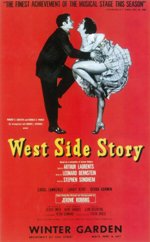
Version 1
West Side Story (1957-09-Broadway Run)
Type de série: OriginalThéâtre: Broadway Run (Broadway - Etats-Unis)Durée : 1 an 9 mois Nombre : 732 représentationsPremière Preview : jeudi 26 septembre 1957Première : jeudi 26 septembre 1957Dernière : samedi 27 juin 1959Mise en scène : Jerome Robbins • Chorégraphie : Jerome Robbins • Producteur : Avec : Mickey Calin (Riff), Larry Kert (Tony), Eddie Roll (Action), Ken LeRoy (Bernardo), Carol Lawrence (Maria), Chita Rivera (Anita), Reri Grist (Consuelo), Tony Mordente (A-Rab), David Winter (Baby John), Grover Dale (Snowboy)
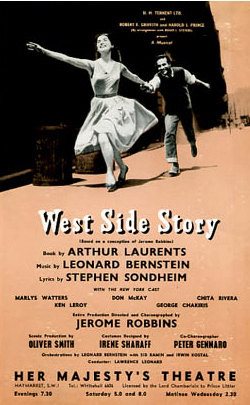
Version 2
West Side Story (1958-12-Her Majesty's Theatre-London)
Type de série: Original LondonThéâtre: Her Majesty's Theatre (Londres - Angleterre) Durée : Nombre : 1039 représentationsPremière Preview : vendredi 12 décembre 1958Première : vendredi 12 décembre 1958Dernière : InconnuMise en scène : Jerome Robbins • Chorégraphie : Jerome Robbins • Producteur : Avec : George Chakiris (Riff), Don McKay (Tony), Eddie Roll (Action), Tony Mordente (A-Rab), Ed Verso (Baby John), Riggs O'Hara (Snowboy), David Bean (Big Deal), Gary Cockrell (Diesel), Michael Kleinman (Gee-Tar), Joe Donovan (Mouthpiece)

Version 3
West Side Story (1960-04-Broadway Run 2)
Type de série: RevivalThéâtre: Broadway Run (Broadway - Etats-Unis)Durée : 7 mois 2 semaines Nombre : 249 représentationsPremière Preview : mercredi 27 avril 1960Première : mercredi 27 avril 1960Dernière : samedi 10 décembre 1960Mise en scène : Jerome Robbins • Chorégraphie : Jerome Robbins • Producteur :

Version 4
West Side Story (1964-04-City Center-New York)
Type de série: RevivalThéâtre: City Center (New-York - Etats-Unis) Durée : 3 semaines Nombre : 31 représentationsPremière Preview : mercredi 08 avril 1964Première : mercredi 08 avril 1964Dernière : dimanche 03 mai 1964Mise en scène : Gerald Freedman • Chorégraphie : Tom Abbottf • Producteur :
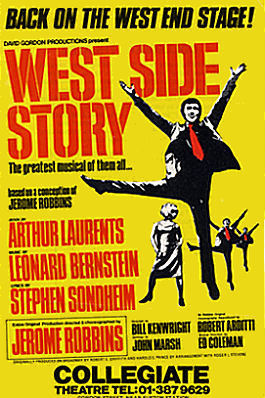
Version 5
West Side Story (1973-07-Collegiate Theatre-London)
Type de série: RevivalThéâtre: Bloomsbery Theatre (Londres - Angleterre) Durée : Nombre : Première Preview : mardi 03 juillet 1973Première : mardi 03 juillet 1973Dernière : InconnuMise en scène : Bill Kenwright • Chorégraphie : Robert Arditti • Producteur : Avec : Tony ... Jim Smilie / Maria ... Rosamund Shelley / Riff ... Roger Finch / Diesel ... Michael Howe / Bernardo ... Peter Daly / Anita ... Clovissa NewcombeCommentaires longs: Cette production jouée au Collegiate Theatre (actuellement le Bloomsbury Theatre) est le passage à Londres d'un très long UK Tour issu de la version originale londonienne jouée au Her Majesty’s en décembre 1968.
Elle reviendra à Londres une nouvelle fois en 1974 au Shaftesbury Theatre

Version 6
West Side Story (1974-12-Shaftesbury Theatre-London)
Type de série: RevivalThéâtre: Shaftesbury Theatre (Londres - Angleterre) Durée : Nombre : Première Preview : jeudi 19 décembre 1974Première : jeudi 19 décembre 1974Dernière : InconnuMise en scène : Bill Kenwright • Chorégraphie : Roger Finch • Producteur : Avec : Lionel Morton (Tony), Christiana Matthews (Maria), Roger Finch (Riff), John Alisdair (Diesel), Paul Hart (Bernardo), Petra Siniawski (Anita)Commentaires : Il s'agit du premier spectacle présenté au Shaftesbury après l'effondrement du plafond le 20 juillet 1973 lors des représentations de 'Hair'.
Se joue jusqu'à l'été 1975.
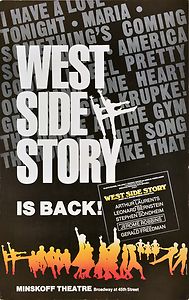
Version 7
West Side Story (1980-02-Minskoff Theatre-Broadway)
Type de série: RevivalThéâtre: Minskoff Theatre (Broadway - Etats-Unis) Durée : 9 mois 2 semaines Nombre : 8 previews - 333 représentationsPremière Preview : jeudi 07 février 1980Première : jeudi 14 février 1980Dernière : dimanche 30 novembre 1980Mise en scène : Jerome Robbins • Chorégraphie : Jerome Robbins • Producteur : Avec : James J. Mellon (Riff), Ken Marshall (Tony), Mark Bove (Action), Todd Lester (A-Rab), Brian Kaman (Baby John), Cleve Asbury (Snowboy), Reed Jones (Big Deal), Brent Barrett (Diesel), G. Russell Weilandich (Gee-Tar), Stephen Bogardus (Mouth Piece)
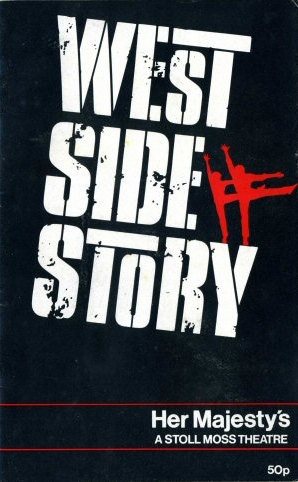
Version 8
West Side Story (1984-05-Her Majesty's Theatre-London)
Type de série: RevivalThéâtre: Her Majesty's Theatre (Londres - Angleterre) Durée : 1 an 4 mois 2 semaines Nombre : Première Preview : mercredi 16 mai 1984Première : mercredi 16 mai 1984Dernière : samedi 28 septembre 1985Mise en scène : Jerome Robbins • Tom Abbottf • Chorégraphie : Jerome Robbins • Tom Abbottf • Producteur : Avec : Steven Pacey (Tony), Jan Hartley (Maria), Richard Pettyfer (Riff), Sam Williams (Bernardo), Lee Robinson (Anita), David Morris (ii) (Chino), Adam Matalon (Action), Peter Leeper (A-Rab), Ian Embleton (Baby John), Garry Noakes (Snowboy)Commentaires : This production had originated at Leicester Haymarket and opened in December 1983. It had been on a UK tour which culminated in a West End season from May 1984 to October 1985. Later cast changes saw Peter Bruce and Karyn O’Neill take over the leads.

Version 9
West Side Story (1998-10-London Run)
Type de série: RevivalThéâtre: London Run (Londres - Angleterre)Durée : 1 an 3 mois Nombre : 522 représentationsPremière Preview : mardi 06 octobre 1998Première : mardi 06 octobre 1998Dernière : samedi 08 janvier 2000Mise en scène : Alan Johnson • Chorégraphie : Alan Johnson • Producteur : Avec : David Habbin (Tony), Katie Knight-Adams (Maria), Edward Baker-Duly (Riff), Edward Hayes-Neary (Diesel), Graham Macduff (Bernardo), Anna-Jane Casey (Anita) , Teddy Green, Alexander DelamereCommentaires : This touring production was as near as possible a complete re-creation of the original version from 40 years earlier - with some added significance in that Jerome Robbins had died a few months prior to its revival. Several critics felt the magnificent show had a whiff of mothballs about it, and needed a completely new approach (like the current “Oklahoma” at the National Theatre.) The “dream ballet” was especially felt to be very dated, and the finger-clicking routines seemed over-choreographed and lacking spontaneity for today’s audiences.) However, others felt it held up extremely well and everyone agreed it remained one of the most brilliant scores in musical theatre. It ran for fifteen weeks at the Prince Edward and then transferred to the Prince of Wales for another year, closing January 8th 2000.
Prince Edward Theatre: 6/10/1998 - 16/1/1999
Prince of Wales Theatre: 22/1/1999 - 8/1/2000
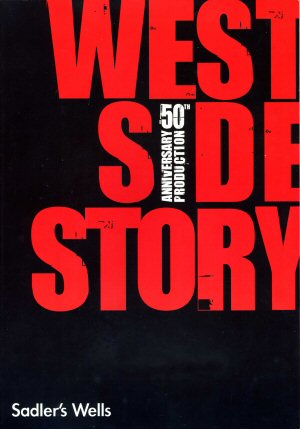
Version 10
West Side Story (2008-07-Sadler's Wells Theatre-London)
Type de série: RevivalThéâtre: Sadler's Wells (Londres - Angleterre) Salle : TheatreDurée : 1 mois 1 semaine Nombre : Première Preview : mardi 22 juillet 2008Première : jeudi 24 juillet 2008Dernière : dimanche 31 août 2008Mise en scène : Joey McKneely • Chorégraphie : Joey McKneely • Producteur : Avec : Ryan Silverman/Scott Sussman ( Tony), Elisa Cordova/Sofia Escobar (Maria ), Leo Ash Evans (Riff), V ictor James Wisehart (Diesel), Alana Gordon/Oneika Phillips (Anita) , Marco Santiago (Bernardo), Steven Greenstein, Julian Alvarez, Sara DobbsCommentaires : This production played a short season in London, following dates in Tokyo, Paris and Beijing. With a cast of 40 and large orchestra, this was an international celebration of the show’s 50 th anniversary. The critics were delighted to report it was as powerful, dramatic and exciting as ever, though several felt the “dream ballet” sequence for the “Somewhere” number was the only give-away of the show’s age – the only part of the show that felt dated and seriously out of place.Commentaires longs: 21 Juillet 09 au 25 Juillet 09 - The Lowry, Salford
14 Juillet 09 au 18 Juillet 09 - Milton Keynes Theatre, Milton Keynes
30 Juin 09 au 11 Juillet 09 - Hippodrome, Bristol
16 Juin 09 au 27 Juin 09 - Regent Theatre, Stoke - on - Trent
2 Juin 09 au 13 Juin 09 - Lyceum Theatre, Sheffield
19 Mai 09 au 30 Mai 09 - His Majesty's Theatre, Aberdeen
5 Mai 09 au 16 Mai 09 - Festival Theatre, Edinburgh
21 Avril 09 au 2 Mai 09 - Birmingham Hippodrome, Birmingham
14 Avril 09 au 18 Avril 09 - New Victoria Theatre, Woking
31 Mars 09 au 11 Avril 09 - Theatre Royal, Nottingham
17 Mars 09 au 28 Mars 09 - Grand Theatre and Opera House, Leeds
10 Mars 09 au 14 Mars 09 - New Wimbledon Theatre, Outer London
24 Février 09 au 7 Mars 09 - Wycombe Swan, High Wycombe
10 Février 09 au 21 Février 09 - Theatre Royal, Newcastle upon Tyne
27 Janvier 09 au 7 Février 09 - Mayflower Theatre, Southampton
6 Janvier 09 au 17 Janvier 09 - Wales Millennium Centre, Cardiff
11 Novembre 08 au 29 Novembre 08 - Theatre Royal, Glasgow
14 Octobre 08 au 1 Novembre 08 - New Wimbledon Theatre, Outer London
30 Septembre 08 au 11 Octobre 08 - The Lowry, Salford
16 Septembre 08 au 27 Septembre 08 - Milton Keynes Theatre, Milton Keynes
2 Septembre 08 au 13 Septembre 08 - New Victoria Theatre, Woking
22 Juillet 08 au 31 Août 08 - Sadler's Wells Theatre
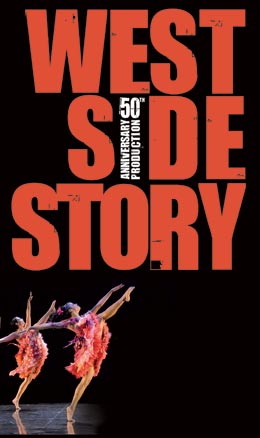
Version 11
West Side Story (2008-09-UK Tour)
Type de série: UK TourThéâtre: UK Tour ( - Angleterre) Durée : 10 mois 3 semaines Nombre : Première Preview : mardi 02 septembre 2008Première : mardi 02 septembre 2008Dernière : samedi 25 juillet 2009Mise en scène : Joey McKneely • Chorégraphie : Joey McKneely • Producteur : Avec : Ryan Silverman/Scott Sussman ( Tony), Elisa Cordova/Sofia Escobar (Maria ), Leo Ash Evans (Riff), V ictor James Wisehart (Diesel), Alana Gordon/Oneika Phillips (Anita) , Marco Santiago (Bernardo), Steven Greenstein, Julian Alvarez, Sara DobbsCommentaires : This production played a short season in London, following dates in Tokyo, Paris and Beijing. With a cast of 40 and large orchestra, this was an international celebration of the show’s 50 th anniversary. The critics were delighted to report it was as powerful, dramatic and exciting as ever, though several felt the “dream ballet” sequence for the “Somewhere” number was the only give-away of the show’s age – the only part of the show that felt dated and seriously out of place.
Dates du tourCommentaires longs: 21 Juillet 09 au 25 Juillet 09 - The Lowry, Salford
14 Juillet 09 au 18 Juillet 09 - Milton Keynes Theatre, Milton Keynes
30 Juin 09 au 11 Juillet 09 - Hippodrome, Bristol
16 Juin 09 au 27 Juin 09 - Regent Theatre, Stoke - on - Trent
2 Juin 09 au 13 Juin 09 - Lyceum Theatre, Sheffield
19 Mai 09 au 30 Mai 09 - His Majesty's Theatre, Aberdeen
5 Mai 09 au 16 Mai 09 - Festival Theatre, Edinburgh
21 Avril 09 au 2 Mai 09 - Birmingham Hippodrome, Birmingham
14 Avril 09 au 18 Avril 09 - New Victoria Theatre, Woking
31 Mars 09 au 11 Avril 09 - Theatre Royal, Nottingham
17 Mars 09 au 28 Mars 09 - Grand Theatre and Opera House, Leeds
10 Mars 09 au 14 Mars 09 - New Wimbledon Theatre, Outer London
24 Février 09 au 7 Mars 09 - Wycombe Swan, High Wycombe
10 Février 09 au 21 Février 09 - Theatre Royal, Newcastle upon Tyne
27 Janvier 09 au 7 Février 09 - Mayflower Theatre, Southampton
6 Janvier 09 au 17 Janvier 09 - Wales Millennium Centre, Cardiff
11 Novembre 08 au 29 Novembre 08 - Theatre Royal, Glasgow
14 Octobre 08 au 1 Novembre 08 - New Wimbledon Theatre, Outer London
30 Septembre 08 au 11 Octobre 08 - The Lowry, Salford
16 Septembre 08 au 27 Septembre 08 - Milton Keynes Theatre, Milton Keynes
2 Septembre 08 au 13 Septembre 08 - New Victoria Theatre, Woking
22 Juillet 08 au 31 Août 08 - Sadler's Wells Theatre
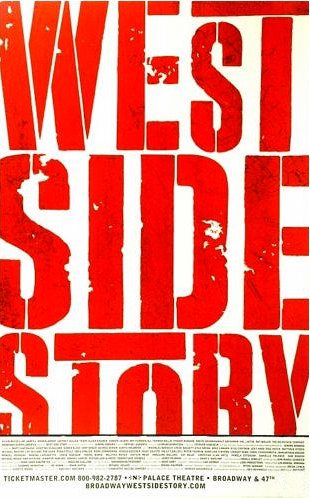
Version 12
West Side Story (2009-02-Palace Theatre-Broadway)
Type de série: RevivalThéâtre: Palace Theatre (Broadway - Etats-Unis) Durée : 1 an 9 mois 2 semaines Nombre : 27 previews - 748 représentationsPremière Preview : lundi 23 février 2009Première : jeudi 19 mars 2009Dernière : dimanche 02 janvier 2011Mise en scène : Arthur Laurents • Jerome Robbins • Chorégraphie : Jerome Robbins • Producteur : Avec : Matt Cavenaugh (Tony), Josefina Scaglione (Maria), George Akram (Bernardo), Cody Green (Riff), Karen Olivo (Anita), Nicholas Barasch (Kiddo (alt.)), Steve Bassett (Lt. Schrank), Kyle Brenn (Kiddo (alt.)), Joshua Buscher (Diesel), Isaac Calpito (Inca)

Version 13
West Side Story (2010-07-Freilichtspiele-Tecklenburg)
Type de série: RevivalThéâtre: Freilichtspiele Tecklenburg (Tecklenburg - Allemagne) Durée : 1 mois 1 semaine Nombre : Première Preview : vendredi 23 juillet 2010Première : vendredi 23 juillet 2010Dernière : samedi 04 septembre 2010Mise en scène : Helga Wolf Wolf • Chorégraphie : Doris Marlis • Producteur : Avec : Lucius Wolter (Tony), Leah Delos Santos (Maria), Lars Kemter (Riff), Gianni Meurer (Bernardo), Sigrid Brandstetter (Anita), Jana Stelley (Anybody's), Hannes Demming (Doc), Stefan Poslovski (Officer Krupke), Michael Schüler (Gladhand), Michael Micheiloff (Schrank), Martin Kiuntke (Action), Harald Tauber (Diesel), Stephan Luethy (Baby John), Nils Haberstroh (Snowboy), Kristian Lucas (Professor), Silvano Marraffa (Chino), Tom Schimon (Ensemble Jets), Jörn Ortmann (Ensemble Jets), Andrew Hill (Ensemble Jets), Philipp Georgopoulos (Ensemble Jets), Anke Merz (Ensemble Jets), Juliane Bischoff (Ensemble Jets), Silja Schenk (Ensemble Jets), Marthe Römer (Ensemble Jets), Sophie Blümel (Ensemble Jets), Esther-Larissa Lach (Ensemble Jets), Jessica Krüger (Ensemble Jets), Daniel Ruiz (Ensemble Sharks), Kevin Foster (Ensemble Sharks), Julian Sylva (Ensemble Sharks), Marius Hatt (Ensemble Sharks), Jan Altenbockum (Ensemble Sharks), Hakan T. Aslan (Ensemble Sharks), Raphaela J. Gross-Fengels (Ensemble Sharks), Angela Hunkeler (Ensemble Sharks), Michelle Escano (Ensemble Sharks), Janina Keppel (Ensemble Sharks), Rachel Colley (Ensemble Sharks), Rebecca Stahlhut (Ensemble Sharks), Laura Fernandez (Ensemble Sharks)
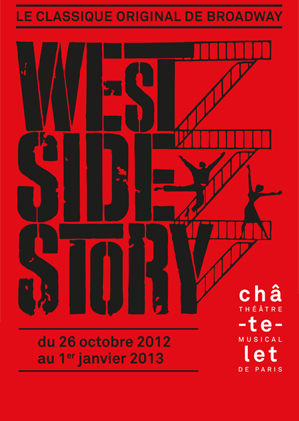
Version 14
West Side Story (2012-10-Théâtre du Châtelet-Paris)
Type de série: RevivalThéâtre: Théâtre du Châtelet (Paris - France) Durée : 2 mois 1 semaine Nombre : 81 représentationsPremière Preview : vendredi 26 octobre 2012Première : vendredi 26 octobre 2012Dernière : mardi 01 janvier 2013Mise en scène : Jerome Robbins • Joey McKneely • Chorégraphie : Jerome Robbins • Joey McKneely • Producteur : Avec : Chris Behmke / Liam Tobin (Tony), Elena Sancho Pereg / Diana Rose Becker (Maria), Yanira Marin(Anita), Andy Jones (Riff), Pepe Munoz (Bernardo), Joe Gioco (Doc), Joe Wojda (Shrank), Mel Shrawder (Krupke), James Michael Reilly (Glad Hand)
The Jets : Rhett Aren Gutter, Brandon Hudson, Michael Bullard, Fred P. Odgaard, Ryan Fitzgerald, Drew Nellessen, Nicholas Sipes, Ryan Ghysels, Tenealle Ferragher, Addie Tomlinson, Courtney Ortiz, Sarah Blodgett, Melanie A. Wildman, Christie Partelow
The Sharks : Nikko Kimzin, Christian Elan Ortiz, Caleb Teicher, Michael Juan Bishop, Charles South, Jerimy Luis Rivera, Armando Reinaldo Yearwood Jr, Maria Victoria Failla, NaTonia Monét, Natalie Williams, Kara Anne Duncan, Emma Sofia Pfaeffle, Naomi C. Walley
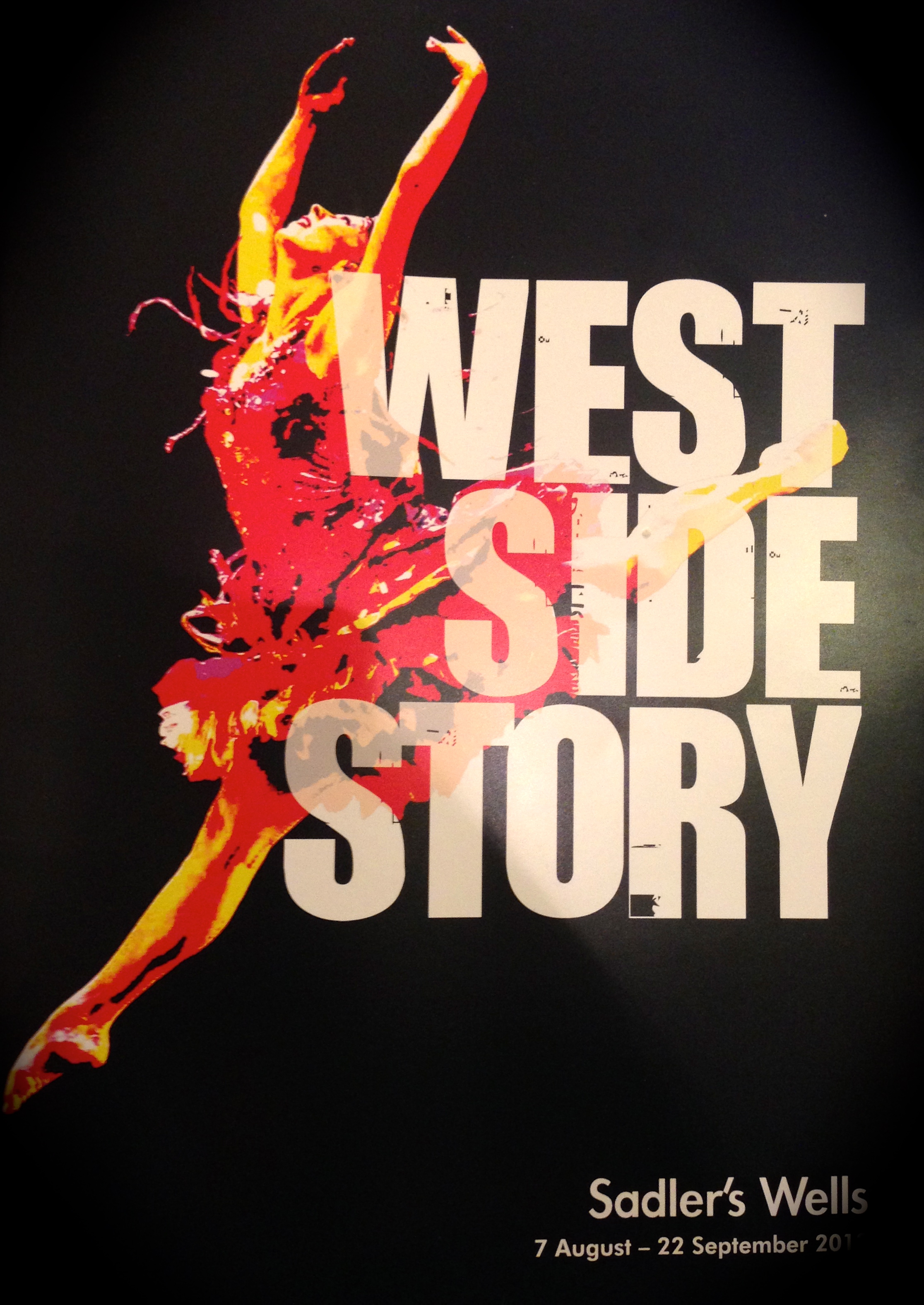
Version 15
West Side Story (2013-08-Sadler's Wells Theatre-London)
Type de série: RevivalThéâtre: Sadler's Wells (Londres - Angleterre) Salle : TheatreDurée : 1 mois 2 semaines Nombre : Première Preview : mercredi 07 août 2013Première : mercredi 07 août 2013Dernière : dimanche 22 septembre 2013Mise en scène : Joey McKneely • Chorégraphie : Joey McKneely • Producteur : Presse : **** "Still as gloriously fresh, relevant and thrilling as ever"
TIME OUT
**** "If you buy one theatre ticket this summer, make it this one. A thrilling, hurtling triumph"
THE OBSERVER
Pas encore de video disponible pour ce spectacle

.png)
.png)





 Parallélisme Shakespeare
Parallélisme Shakespeare